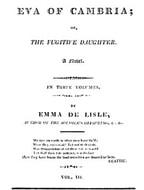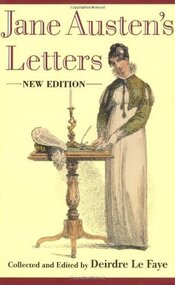| This blog explores social attitudes in Jane Austen's time, discusses her novels, reviews forgotten 18th century novels, and throws some occasional shade at the modern academy. The introductory post is here. My "six simple questions for academics" post is here. |

We don't meet Eva and there is no mention of her until 185 pages into the story. We start with the history of another family; an older man named Percy Eddington, who never married because he was disfigured in a carriage accident. He lives with his spinster sister Helena, and --crash! What was that?
That was another carriage accident. This one brings a distressed widow and a lovely young lady to their door. Laura becomes Percy’s bride, in a May/September pairing. The Eddingtons are happy, devout, and kind to their tenants; good-hearted Welsh people who like to drink to excess whenever Mrs. Eddington presents her husband with a child. They have three children: Julius, Horatio, and Helen. Synopsis and spoilers follow...







 RSS Feed
RSS Feed